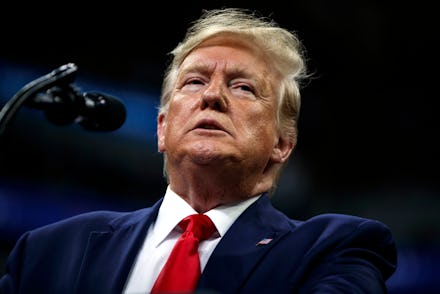The battle over Trump's financial records could go all the way to the Supreme Court

Despite President Trump's best efforts to protect his financial records, a federal court ruled Friday that his accounting firm must turn over documents subpoenaed by the House. A decision made by the Circuit Court of Appeals in Washington, D.C., determined that the Trump administration cannot block the House Oversight and Reform Committee from asking for eight years of financial records related to the president's accounts managed by Mazars USA. The House issued a subpoena for the documents earlier this year, and per the judge's ruling the accounting firm must turn over the requested records.
"Contrary to the president's arguments, the committee possesses authority under both the House Rules and the Constitution to issue the subpoena, and Mazars must comply," Judge David Tatel wrote in the court's 2-1 opinion. The president's legal team had argued that the subpoena was beyond the House's authority because the requested documents were not related to lawmaking.
While the decision appears to be a win for House Democrats who have been pursuing the president's financial records and tax returns on multiple fronts, it does not guarantee the release of the requested files. The court set a seven-day hold on the legal effect of its ruling, allowing the Trump team an opportunity to appeal — which they more than likely will do. From here, Trump can either escalate the ruling to a full appeals court rather than the three-judge panel that heard the case, or take it directly to the Supreme Court. Jay Sekulow, Trump's lawyer, told NBC News that the legal team is "reviewing the opinion and evaluating all appellate options."
Democrats on the House Oversight and Reform Committee have been chasing the documents for months now, with no cooperation from Trump. The committee needs access to the records, which date back to 2009, in order to determine whether the president accurately filled out the financial disclosure forms that are required of people running for federal office. The investigation was spurred by former Trump lawyer Michael Cohen informing Congress that Trump would often inflate or deflate his assets when it served his purposes. Knowingly lying on financial disclosure forms is considered a crime and could result in criminal prosecution, according to the U.S. Office of Government Ethics.
This is the second loss the president has been dealt in his attempts to block the House committee's investigation into his financial dealings. This May, a federal judge ruled against Trump in his attempts to prevent the subpoena of the Mazars documents. The judge determined that the House had "valid legislative purposes" for requesting the documents, rejecting the argument that releasing the financial records would risk "irreparable harm" to the president. Trump has also been fighting another subpoena attempting to obtain documents from Deutsche Bank and Capital One, and he additionally lost a case earlier this week seeking to block the release of his tax returns to the Manhattan district attorney's office.
While the court's decision moves Trump one step closer to having to turn over his financial records, there may be a silver lining for the president that looms as a significant threat for any attempt to investigate him for wrongdoing. While the majority of the court ruled against Trump, one judge — Neomi Rao — dissented. Rao was appointed to her position by Trump earlier this year, and in her dissenting opinion she attempted to lay the groundwork for the judiciary branch to block an impeachment.
Trump has already appointed two Supreme Court justices in Neil Gorsuch and Brett Kavanaugh, giving the high court a conservative lean. The two newest justices surprisingly have not been in lock step thus far, but the possibility of both men ruling in favor of the person who appointed them looms large. That could present a challenge for the House Oversight and Reform Committee, should Trump and his legal team decide to take his challenge of the subpoena all the way to the Supreme Court.